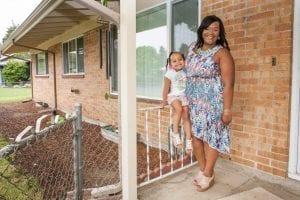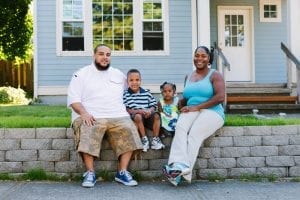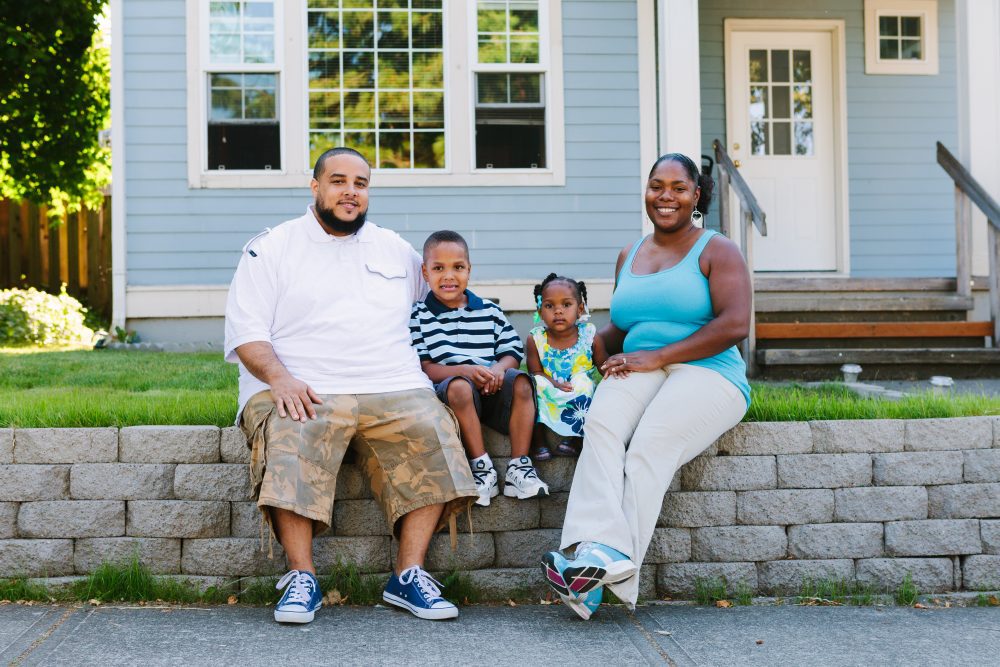
A family who purchased a home through Proud Ground, an organization that creates permanently affordable homeownership opportunities for first-time homebuyers using the community land trust model.
Longtime North and Northeast Portland resident Ava Johnson* remembers having just begun high school when she, her grandmother, and her five siblings were forced to move out of their home. At the time, their property had been purchased through eminent domain to make space for the expansion of the Legacy Emanuel Medical Center. Decades later, with a family of her own, Johnson dreamt of returning to the community that she had grown up in.
When she heard that the Portland Housing Bureau was creating opportunities for households with generational ties to that area to become first-time homebuyers through its North and Northeast Preference Policy, she applied. The policy gives priority for housing funded by the city’s housing bureau to residents who were displaced, are at risk of displacement, or are the descendants of families who were displaced due to urban renewal in North and Northeast Portland neighborhoods. Under the policy, applicants receive up to six “preference points” based on the location of their current or past residence, or that of their parent, guardian, or grandparent, falling within identified areas of concentrated urban renewal. Families who were impacted by eminent domain are given first priority.
Johnson received preference and chose to work with Proud Ground, a nonprofit that helps create permanently affordable homeownership opportunities for first-time homebuyers using the community land trust model.
As part of the African American Alliance for Homeownership Collaborative, Proud Ground and its partners work with the Portland Housing Bureau to help families achieve mortgage readiness and purchase homes in their neighborhoods. Homeownership partners lower the cost of homes by using grants from the Portland Housing Bureau to ensure preference-policy families can afford residences in communities that are now unaffordable to low- and moderate-income families.
Receiving preference is only the first step to homeownership, with families like the Johnsons working hard to become mortgage-ready and qualify for a traditional mortgage as a first-time homebuyer. As a HUD-approved counseling agency, Proud Ground’s homeownership counselors support families become mortgage-ready and purchase a permanently affordable home through the community land trust. However, not all households that qualify for preference attain homeownership; many times due to systemic racial barriers to wealth building that make the path to homeownership long and difficult. For example, Johnson was one of 15 family members who applied through the Preference Policy application process, but the only one to become a first-time homeowner through the program.
Johnson was Proud Ground’s first preference-policy household to close on their home. For Johnson, the opportunity to purchase went beyond homeownership to solidifying her family’s history in their community. “I knew my grandmother would be so proud to know that one of her grandchildren continued the family legacy of homeownership,” she said, recognizing the generational impact of permanently affordable homeownership. As part of Proud Ground’s community land trust, Johnson’s home will stay affordable for her and her family. If she or her heirs were ever to sell, the home would go to another income-qualified family on Proud Ground’s waitlist, preserving the original grant that was put in the home to ensure its affordability forever.

Proud Ground has served more than 350 low- and moderate-income households throughout Greater Portland Metro. Photo courtesy of Proud Ground
The City of Portland embraced the community land trust model 18 years ago when it launched the Portland Community Land Trust, now known as Proud Ground. The goal of implementing this model was to maintain the land’s permanent affordability to ensure that income-qualified households had access to homes they could afford, in perpetuity. With efforts to reduce the minority homeownership gap, Proud Ground has served more than 350 low- and moderate-income households throughout Greater Portland Metro. Despite these efforts, there are still more than 450 families on Proud Ground’s wait list, two-thirds of which are households of color.
With the current housing crisis causing the region’s core neighborhoods to appreciate, price out, and displace lower-income households, this model works to deter such displacement of these historical communities. Areas like North and Northeast Portland that were once the cultural centers for the African-American community have experienced the displacement of well over 10,000 households—many of whom were forced to move to less expensive areas and away from their communities.
New pathways to homeownership, like the preference policy, ensure the most at-risk communities are protected from classic gentrification trends. The community land trust model presents one of the most concrete ways to prevent displacement by a community-entity holding the land in trust to ensure it is always accessible to an income-qualified household. Requiring permanent affordability by holding the land in trust is a unique and powerful way to maintain cultural and economic diversity in neighborhoods.
*The resident’s name has been changed for privacy.






I think proud ground is a great program but some of the ones in Rosemont commons could use a little sprucing up (when I lived there anyway)
While Proud Ground owns the land under our homes, the homeowners have full control of their home and any ‘sprucing up’ that they see necessary. In this way, Proud Ground homes act just like any other homeownership model. We support our homeowners with post-purchase classes and home repair IDA’s to point them in the right direction when they choose to take on a home maintenance project.
California did a good thing when it eliminated “redevelopment” except for truly public roads and facilities. Would that other states would follow.
One stellar thing about urban redevelopment areas (URAs) in Portland; fully 45% of the gross revenue in all the URAs must be invested into affordable housing. Significantly greater than the common practice in California prior to Governor Jerry Brown’s second administration. Also Oregon state law limits URAs to 15% of the land of the incorporated area of the city so some of the abuses of large swaths of vacant land being held off the tax rolls, which occurred in California, simply cannot and will not occur in Oregon. It’s a fair policy which protects the K-12 school districts’ property tax base.